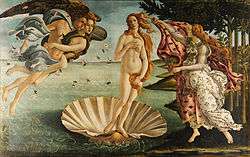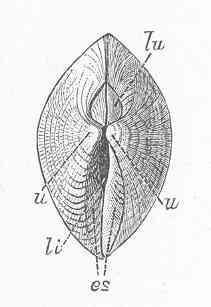Definify.com
Webster 1913 Edition
Venus
Ve′nus
Webster 1828 Edition
Venus
VE'NUS
,Definition 2026
Venus
Venus
Translingual
Etymology
Latin after Venus (“goddess of beauty, love, sexual intercourse”). See images.
Proper noun
Venus f
- A taxonomic genus within the family Veneridae – the true venus clams.
Hypernyms
- (genus): Mollusca - phylum, Bivalvia - class, Heterodonta - subclass, Veneroida - order, Veneroidea - superfamily, Veneridae - family
Hyponyms
- For the numerous species see
 Venus on Wikispecies.Wikispecies
Venus on Wikispecies.Wikispecies

English

Proper noun
Venus
- (Roman mythology) The goddess of love, beauty, and natural productivity; the Roman counterpart of Aphrodite.
- The second planet in our solar system, named for the goddess; represented in astronomy and astrology by ♀.
- (obsolete) Sexual activity or intercourse; sex, lust, venery.
- 1621, Robert Burton, The Anatomy of Melancholy, II.ii.2:
- Immoderate Venus in excess, as it is a cause, or in defect; so, moderately used, to some parties an only help, a present remedy.
- 1621, Robert Burton, The Anatomy of Melancholy, II.ii.2:
- (poetry): Love; sex.
Derived terms
Translations
|
|
|
|
See also
- (planets of the Solar System) planets of the Solar System; Mercury, Venus, Earth, Mars, Jupiter, Saturn, Uranus, Neptune
Anagrams
Catalan
Proper noun
Venus f
- Venus (goddess, planet)
See also
- (planets of the Solar System) planetes del sistema solar; Mercuri, Venus, Terra, Mart, Júpiter, Saturn, Urà, Neptú
Danish
Proper noun
Venus
See also
(planets of the solar system) planeter i solsystemet; Merkur, Venus, Jorden/jorden, Mars, Jupiter, Saturn, Uranus, Neptun [edit]
Finnish
Proper noun
Venus
Declension
| Inflection of Venus (Kotus type 39/vastaus, no gradation) | |||
|---|---|---|---|
| nominative | Venus | — | |
| genitive | Venuksen | — | |
| partitive | Venusta | — | |
| illative | Venukseen | — | |
| singular | plural | ||
| nominative | Venus | — | |
| accusative | nom. | Venus | — |
| gen. | Venuksen | ||
| genitive | Venuksen | — | |
| partitive | Venusta | — | |
| inessive | Venuksessa | — | |
| elative | Venuksesta | — | |
| illative | Venukseen | — | |
| adessive | Venuksella | — | |
| ablative | Venukselta | — | |
| allative | Venukselle | — | |
| essive | Venuksena | — | |
| translative | Venukseksi | — | |
| instructive | — | — | |
| abessive | Venuksetta | — | |
| comitative | — | — | |
Anagrams
Galician
Proper noun
Venus f
See also
- (planets of the Solar System) planetas do sistema solar; Mercurio, Venus, Terra, Marte, Xúpiter, Saturno, Urano, Neptuno
German
Pronunciation
Proper noun
Venus f (genitive Venus)
See also
Icelandic
Etymology
Pronunciation
- IPA(key): /ˈvɛːnʏs/
- Rhymes: -ɛːnʏs
Proper noun
Venus f
- (Roman mythology) Venus (goddess)
- Venus (planet)
- A female given name
Latin
Etymology
From Proto-Italic *wenos (“love”), from Proto-Indo-European *wenh₁- (“to wish, love”). See also Latin veneror, venia and English wish.
Pronunciation
- (Classical) IPA(key): /ˈwe.nus/
Proper noun
Venus f (genitive Veneris); third declension
- Venus, Roman goddess of natural productivity.
- Venus, the second planet in our solar system.
Inflection
Third declension.
| Case | Singular | Plural |
|---|---|---|
| nominative | Venus | Venerēs |
| genitive | Veneris | Venerum |
| dative | Venerī | Veneribus |
| accusative | Venerem | Venerēs |
| ablative | Venere | Veneribus |
| vocative | Venus | Venerēs |
Derived terms
References
- Venus in Charlton T. Lewis and Charles Short (1879) A Latin Dictionary, Oxford: Clarendon Press
Northern Sami
Etymology
Borrowing from Norwegian Venus.
Proper noun
Venus
- Venus (planet)
Inflection
| Odd, no gradation | ||
|---|---|---|
| Nominative | Venus | |
| Genitive | Venusa | |
| Singular | Plural | |
| Nominative | Venus | Venusat |
| Accusative | Venusa | Venusiid |
| Genitive | Venusa | Venusiid |
| Illative | Venusii | Venusiidda |
| Locative | Venusis | Venusiin |
| Comitative | Venusiin | Venusiiguin |
| Essive | Venusin | |
| Possessive forms | |||
|---|---|---|---|
| Singular | Dual | Plural | |
| 1st person | Venusan | Venuseame | Venuseamet |
| 2nd person | Venusat | Venuseatte | Venuseattet |
| 3rd person | Venusis | Venuseaskka | Venuseaset |
See also
Norwegian
Proper noun
Venus
See also
venus
venus
Latin
Alternative forms
Etymology
From Proto-Indo-European *wes- (“to sell, buy”). Cognate with vīlis, Ancient Greek ὦνος (ônos), ὠνέομαι (ōnéomai, “to buy”), Sanskrit वस्नयति (vasnayati, “to haggle”), वस्न (vasna, “price”).
Pronunciation
- (Classical) IPA(key): /ˈweː.nus/, [ˈweː.nʊs]
Noun
vēnus m (genitive vēnūs); fourth declension
Inflection
Fourth declension.
| Case | Singular | Plural |
|---|---|---|
| nominative | vēnus | vēnūs |
| genitive | vēnūs | vēnuum |
| dative | vēnuī | vēnibus |
| accusative | vēnum | vēnūs |
| ablative | vēnū | vēnibus |
| vocative | vēnus | vēnūs |
Derived terms
References
- venus in Charlton T. Lewis and Charles Short (1879) A Latin Dictionary, Oxford: Clarendon Press
- venus in Charlton T. Lewis (1891) An Elementary Latin Dictionary, New York: Harper & Brothers
- VENUS in Charles du Fresne du Cange’s Glossarium Mediæ et Infimæ Latinitatis (augmented edition, 1883–1887)
- Félix Gaffiot (1934), “venus”, in Dictionnaire Illustré Latin-Français, Paris: Hachette.
- venus in Harry Thurston Peck, editor (1898) Harper's Dictionary of Classical Antiquities, New York: Harper & Brothers
- venus in William Smith, editor (1848) A Dictionary of Greek Biography and Mythology, London: John Murray
- De Vaan, Michiel (2008) Etymological Dictionary of Latin and the other Italic Languages (Leiden Indo-European Etymological Dictionary Series; 7), Leiden, Boston: Brill
